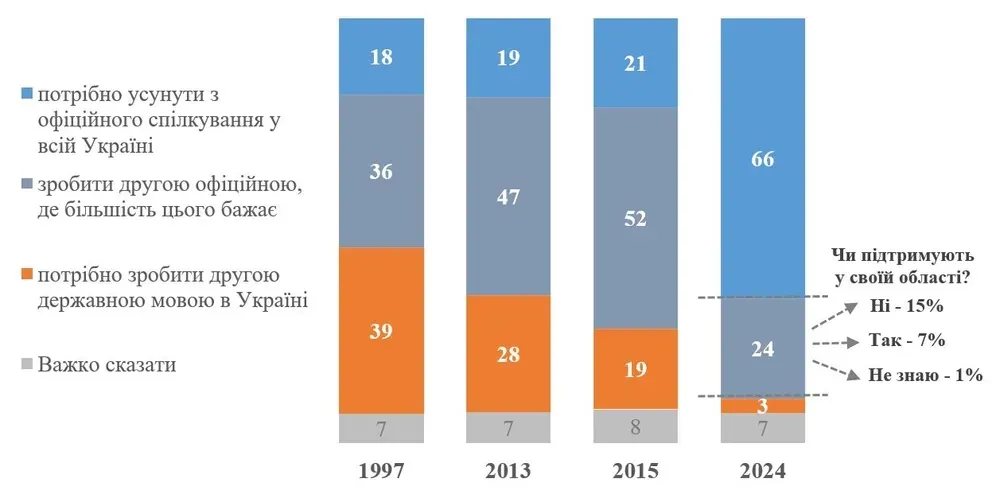Most Ukrainians believe that russian should be eliminated from official communication - KIIS
Kyiv • UNN
Most Ukrainians favor the complete elimination of the russian language from official communication after a full-scale russian invasion in February 2022.

Most Ukrainians are in favor of the complete elimination of the Rrussian language from official communication. This is evidenced by the results of a survey conducted by the Kyiv International Institute of Sociology, UNN reports.
Details
As of February 2024, the vast majority of Ukrainians - 66% - believe that russian should be removed from official communication.
Only 3% believe that russian should be granted the status of a second state language. And 24% believe that russian can become an official language in regions where the majority of people want it
Among the 24% who support the official status in certain regions, 15% are against russian becoming the official language in their region. 7% would like it to become the official language in their region (another 1% have not decided on their position).
Thus, by 2024, there are 10% of those in Ukraine who would like to see russian either official in their region or a second state language. Instead, 81% either want it removed from official communication throughout the territory or are against its use in their region

Addendum
The KIIS adds that the most significant changes are taking place in the South and East. Thus, in the South of Ukraine, back in 2015, 37% wanted to see russian as the second state language, and 43% believed that it could become the official language where the majority of the population wants it.
Instead, in February 2024, the majority of southerners - 54% - were in favor of the complete elimination of russian from official communication.
Also, the share of those who believe that russian should be granted state status has decreased to 6%. There are still 30% of those who believe that russian can become an official language in certain regions, but 15% of them are against russian being an official language in their region.
At the same time, in the East of Ukraine, from 3% in 2015 to 40%, there are now more people who support the elimination of the russian language from official communication throughout the territory. At the same time , the number of those who support the state status of the russian language has decreased from 31% to 6%.
KIIS Director Anton Grushetsky emphasized that Ukraine maintains a predominantly normal (positive or neutral) attitude toward russian-speaking citizens
It is noteworthy that the paradigm of perception of the Ukrainian language in terms of age has changed. Back in the early 2000s (and in fact, even later), many people associated the Ukrainian language as the language of older people and people from rural areas (the language of "grandparents"). Now we can see that the youngest Ukrainians are the ones who insist on the sole state and official status of the Ukrainian language the most
According to him, the process of development of the Ukrainian language and its spread in previously predominantly russian-speaking territories is long and gradual
For reference
The survey was conducted from February 17 to 23 as part of the Omnibus nationwide public opinion poll. A total of 1,052 respondents living in all regions of Ukraine (except Crimea) were interviewed by telephone using a computer based on a random sample of mobile phone numbers.
The survey was conducted with adults (aged 18 and older) who were citizens of Ukraine and resided in the government-controlled territory of Ukraine at the time of the survey.
The sample did not include residents of the territories temporarily not controlled by the Ukrainian authorities, and the survey was not conducted with citizens who left the country after February 24, 2022.
Formally, under normal circumstances, the statistical error of such a sample (with a probability of 0.95 and taking into account the design effect of 1.1) did not exceed 3.4% for indicators close to 50%, 3.0% for indicators close to 25%, 2.1% for indicators close to 10%, and 1.5% for indicators close to 5%. (...)
In general, we believe that the results obtained still retain high representativeness and allow us to analyze public sentiment quite reliably.
Recall
Language Ombudsman Taras Kremin discussed with representatives of the Ukrainian World Congress (UWC) the provision of Ukrainian language education for more than 600,000 Ukrainian children living abroad.